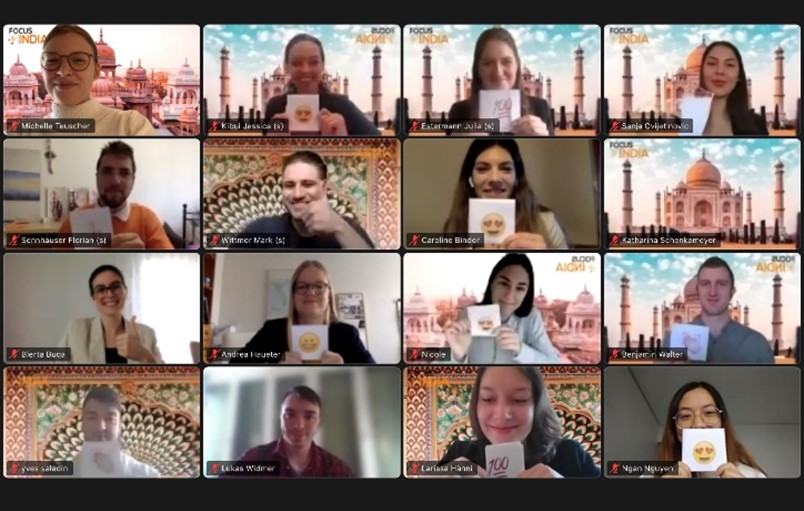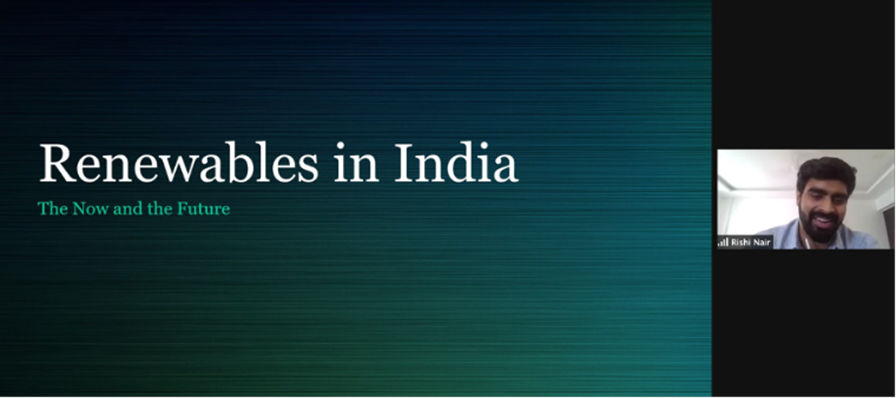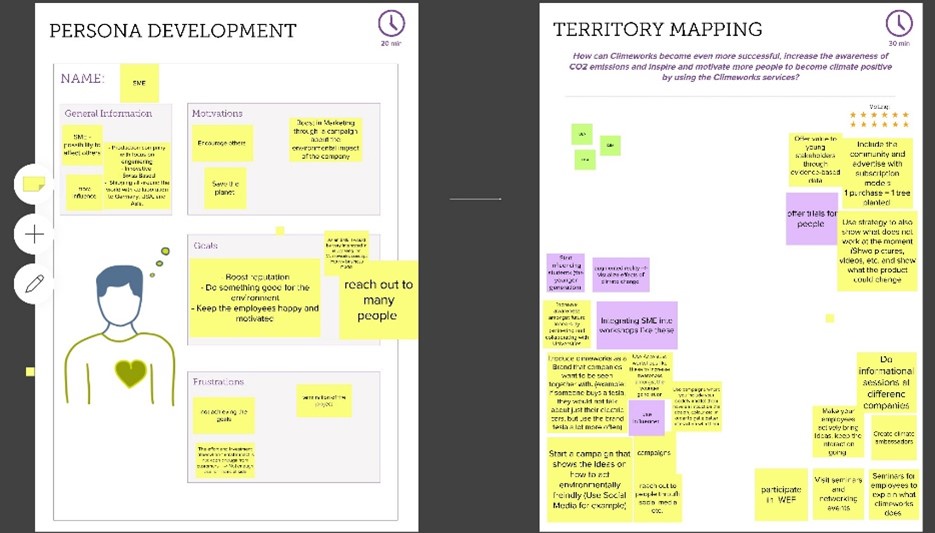
21.4.2021 | School of Business
Focus India – organised by students for students
52 people participated in the Focus India preparatory online seminar between 15 and 19 February 2021 – consisting of students, speakers and organisers. The participants gained insights into various aspects of India with a focus on its business environment. All the seminars and events of 2021 will take place online, due to the Corona Pandemic.
Focus India is one of the four international student projects of the University of Applied Sciences Northwestern Switzerland (FHNW), alongside Insight China, connectUS and exploreASEAN. It is organised by students for students with the core objective to give students insights into the region concerned. The preparatory seminar was full of inspiring speakers who explored the history and culture of India as well as the current situation and the topic of sustainability. Aradhna Seti from Namaste Switzerland took the participants on a historical journey into India, showing the deep-rooted historical influences spanning the centuries and the interplay of these with the modern world. They have seen many rulers and battles. The Guptas, the Pallava and the British have all left their footprints in India, some of which can still be seen today, such as the Taj Mahal and the Red Fort. Aradhna Seti comments, “The social evils of today, were the necessities of yesterday”. Today, mentalities have changed and there is an urge to modernise. In the past, gender discrimination and favouring males over females were very important. More men meant greater support in providing for the family. Even today, these processes are visible, but social rules are much more relaxed and young people have much more freedom.
The Topic of intercultural exchange among students
 The students learned more about Indian culture in a session on intercultural exchange. It was run jointly with the Athena School of Management from Mumbai and provided the opportunity for students from both schools to exchange ideas in small groups. Due to the Corona situation, students in Mumbai also have distance learning. This is an advantage for many because they do not have to look for accommodation in Mumbai; most of the students therefore seemed to embrace distance learning. They were all very curious to hear what things are like in Switzerland because of the Corona situation. In general, they had an openness to new things and to international collaboration and were interested in the exchange among many young people from different countries.
The students learned more about Indian culture in a session on intercultural exchange. It was run jointly with the Athena School of Management from Mumbai and provided the opportunity for students from both schools to exchange ideas in small groups. Due to the Corona situation, students in Mumbai also have distance learning. This is an advantage for many because they do not have to look for accommodation in Mumbai; most of the students therefore seemed to embrace distance learning. They were all very curious to hear what things are like in Switzerland because of the Corona situation. In general, they had an openness to new things and to international collaboration and were interested in the exchange among many young people from different countries.
In another session, Joel Kistler, former project manager of Focus India and Syed Shad, both from BBC Bircher Smart Access talked about working in India in times of Corona. Syed Shaid said, “The pandemic has created many challenges, but also opportunities”.

In the Indian market, it is important to build strong customer relationships at the beginning. However, given that face-to-face meetings have been impossible, they have had to react flexibly to the situation and keep up with digital transformation. Joel Kistler added that there are general differences between the Swiss market and the Indian market. In Switzerland, partners work together directly whereas in India you first have to build up all your connections from the bottom (the employee) to the top (the senior person).
Topic of sustainability

The topic of sustainability was also discussed at the Preparatory Seminar 2021. Rishi Nair spoke about the present and future of renewable energy in India. Currently, India is the third largest energy consumer in the world with more than half of the energy consumed coming from non-renewable sources. Hydropower is not an ideal solution for India because on the one hand there could be a risk of flooding and at the same time there is also irregular rainfall. However, it has not been abandoned, and other solutions are being sought. Other challenges regarding the expansion of renewable energies include the storage and distribution of electricity. Here, unfortunately, the infrastructure to handle the influx of renewable energy is lacking. The Corona virus interrupted the development of a green energy corridor, which could enable the transport of energy. There has also been a loss of momentum due to economic risks, travel bans and other logistical issues. Although India still has a lot of work to do and needs to build over 70% of its renewable energy capacity, Rishi Nair said the future looks promising. There is a will to change, and the focus will certainly be on wind and solar energy.
To add variety, the student organisers also implemented interactive activities for the seminar participants. These included a Design Thinking Workshop about the company Climeworks in the context of sustainability and digitalisation, delivered by Accenture. Stephan Pique highlighted Climeworks’ pioneering work as part of his interactive workshop. Climeworks is an ETH spin-off that has developed a modular system that filters carbon dioxide from the air. The air passes through a filter and carbon dioxide-free air is released back into the atmosphere. When the filter is full of carbon dioxide the machine heats up to 200 degrees Celsius and converts it to a gaseous form. This year, Climeworks has started its newest plant, called "Orca", in Iceland. Orca takes carbon capture to the next level. This plant is expected to filter up to 4000 tons of carbon dioxide per year. During the workshop, the participants worked on ideas about how to make Climeworks even better known and to inspire 1 billion people to remove carbon dioxide from the air.
 The Corona pandemic has changed much, but it has also created new opportunities. Though all seminars were online, the Focus India Project Team succeeded in organising excellent speakers and creating a very varied seminar.
The Corona pandemic has changed much, but it has also created new opportunities. Though all seminars were online, the Focus India Project Team succeeded in organising excellent speakers and creating a very varied seminar.
Text: Michelle Teuscher
